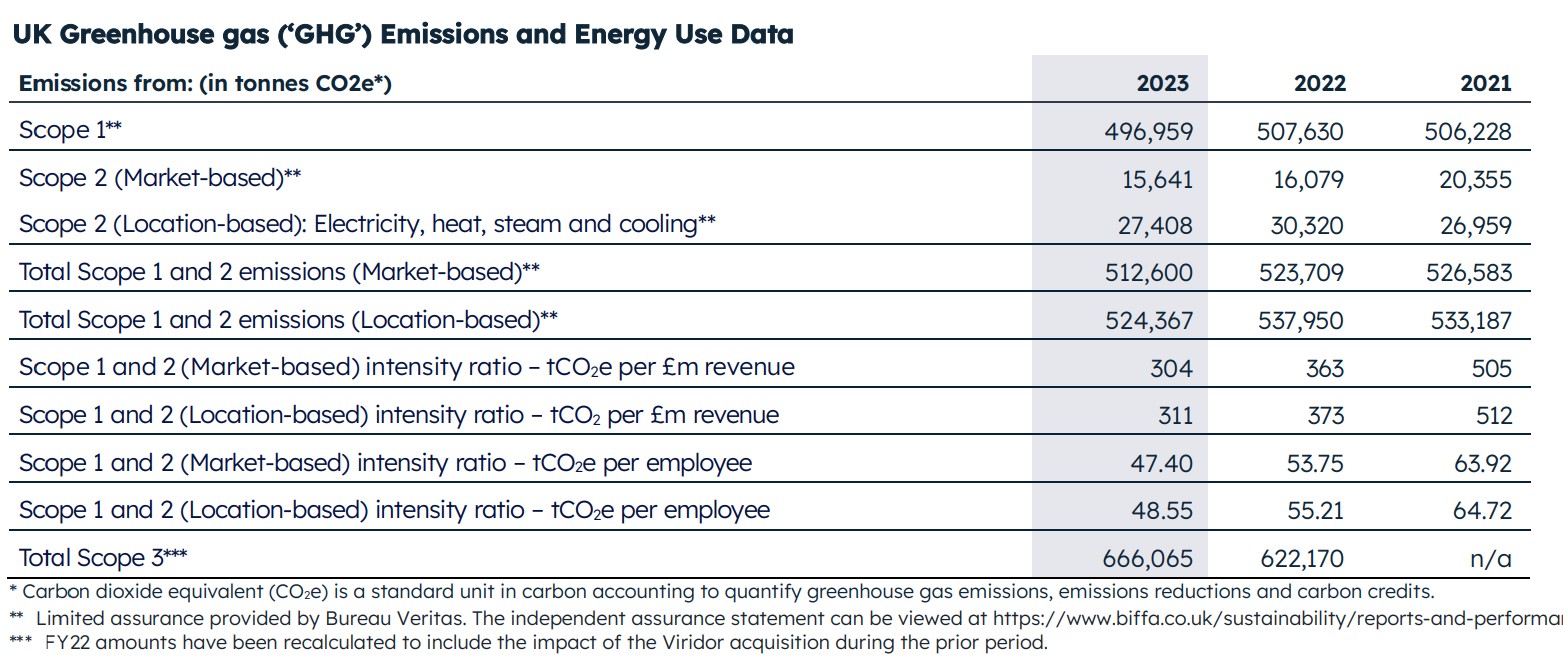However, the report did show that its scope 3 emissions, those not cause by the company itself but through the supply chain, have risen by 43,895 tonnes of carbon dioxide equivalent (CO2e). This was put down to its Newhurst energy recovery facility coming online at the end of the financial year.
Scope 1 emissions relate to those that an organisation owns or control directly, whereas scope 2 are emissions that a company causes indirectly and come from where the energy it purchases and uses is produced.
Achievements
Biffa highlighted that the reduction in scope 1 and 2 carbon emissions has “been achieved through the continued improvement of our landfill gas capture and efficiency gains within our operations.”
Other contributions to this were a 7% increase in collection route efficiencies in 2022–2023 and expanding it’s fleet of electric vehicles to 120.
A rerouting exercise, in conjunction with the integration of acquisitions, “has streamlined operations and resulted in significant environmental benefits, saving approximately 1,400 tonnes of CO2e emissions annually,” Biffa said.
The company added it is also progressing plans to install solar panels on its landfill sites, despite “biodiversity requirements on our landfill sites conflicting with our solar plans”.
The report noted: “We are continuing to manage this for the best sustainable outcome and, looking to the future, planning applications for several solar power projects have been submitted, with the anticipation of generating a total capacity of 50MW.”
Biffa has an important role to play in delivering sustainable solutions to help combat the UK’s waste challenges
- Michael Topham, Biffa
Targets
Biffa also announced today that its near-term scope 1, 2 and 3 emissions targets have been validated by the Science Based Targets initiative (SBTi), “demonstrating the company’s commitment to the Paris Agreement goals”.
Biffa has committed to reducing absolute scope 1 and 2 greenhouse gas emissions by 50% by 2030 from a 2019 base year, and reducing absolute scope 3 greenhouse gas emissions by 25% by 2030 from a 2022 base year. Additionally, Biffa has committed that 27.6% of its suppliers by emissions, covering purchased goods and services, upstream transportation and distribution, and waste generated in operations, will have science-based emissions targets by 2027.
The SBTi is a collaboration between CDP, the United Nations Global Compact, World Resources Institute and the World Wide Fund for Nature (WWF), which defines and promotes best practice in setting science-based emission reductions targets.
Michael Topham, Biffa’s chief executive officer, said: “This validation from SBTi is a testament to the hard work and dedication of everyone at Biffa to ensure sustainability continues to be at the heart of our business. We are committed to leading the way in sustainable waste management and have already made great progress in reducing our scope 1 and 2 carbon emissions by almost 30% compared to our 2019 baseline, but we need to go further. Through fostering strong partnerships with our suppliers, we aim to be a sustainability leader, creating a culture and supply chain that actively pursues innovation, efficiency and transparency.
“Biffa has an important role to play in delivering sustainable solutions to help combat the UK’s waste challenges, and our latest Sustainability Report highlights the steps we have taken towards reducing both our own environmental impact and that of our customers, and supporting our communities. These small steps can lead to big change, which we can all play a role in.”












Subscribe for free